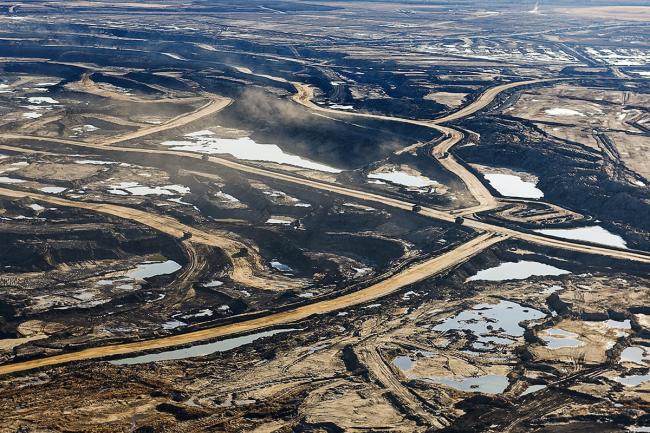Articles Menu

Apr. 13, 2023
Despite pledging to reach net-zero greenhouse gas emissions, Canada’s Big 5 banks have invested over $1 trillion in coal, oil and gas companies since 2016, upping the risk to the Canadian economy as the energy transition unfolds.
In just seven years since the Paris Agreement was signed, RBC, Scotiabank, TD, BMO and CIBC have provided approximately $1.1 trillion to fossil fuel companies, according to data sourced from financial databases and published Thursday by a group of civil society organizations. The world’s 60 largest banks provided $7.4 trillion over that same period, meaning Canada’s largest banks are responsible for approximately 15 per cent of global investment in fossil fuels — whose greenhouse gas emissions are the primary driver of climate change — since 2016.
The report, titled Banking on Climate Chaos, was authored by the Rainforest Action Network, Indigenous Environmental Network, BankTrack, Oil Change International, Reclaim Finance, Sierra Club and Urgewald.
Last year, the Big 5 invested roughly $185 billion in fossil fuel companies. RBC led the pack with $56.6 billion worth of deals, followed by Scotiabank ($39.5 billion), TD ($39 billion), BMO ($26 billion) and CIBC ($24 billion).

Canadian banks are overwhelmingly financing the oilsands as foreign banks divest from the region. In 2022, oilsands companies received $28 billion from banks, with nearly 90 per cent of those funds coming from Canada’s Big 5.
Earlier this year, U.K.-based Barclays, a major financier of fossil fuels, announced it would stop financing the oilsands because of the region’s high-carbon, high-cost product. That follows a similar trend to fossil fuel companies like BP, Shell and TotalEnergies leaving the region.
“There's been an interesting process of renationalization of the oilsands over the last 10 years, with the big global oil companies, with the exception of Exxon, leaving,” explained Greenpeace Canada senior energy strategist Keith Stewart. “Their assets were bought up mostly by Canadian companies –– CNRL, Suncor, Cenovus –– and similarly, bank finance is increasingly coming from Canadian (banks).”
The public should understand this as an increasingly risky bet in an era of energy transition, Stewart said. Canadian banks and pension funds are “overexposed” to fossil fuels because they’ve been historically important to the economy, relative to other countries, he said.
“That means that if we try to continue with business as usual and hope for the best, we could very well end up with the oil sector looking like the cod fisheries,” he said, referring to the collapse of Newfoundland and Labrador’s cod industry in 1992. “Canada has a lot of experience with resource booms and busts, and we need to learn from those experiences and plan for a transition that is, to use a forbidden phrase, just and fair.”
Despite pledging to reach net-zero greenhouse gas emissions, Canada’s Big 5 banks have invested over $1 trillion in coal, oil and gas companies since the Paris Agreement was signed. #cdnpoli - Twitter
As previously reported by Canada’s National Observer, the risk for banks is that as the energy transition to renewables unfolds globally, demand for fossil fuels will collapse, leaving their investments worth less, if not worthless. A study last year found Canadians stand to lose more than $100 billion in the energy transition as these fossil fuel assets become stranded.
None of the Big 5 banks returned requests for comment.
In a 2021 report, RBC estimated Canada slashing emissions 75 per cent by 2050 would require mobilizing $2 trillion over three decades. “Based on our estimates, governments, businesses and communities would have to spend at least $60 billion a year to cut Canada’s emissions by 75 per cent from current levels, which is about as far as we can get with current technologies,” the study found.
Stewart calls that finding “incredible” in the face of learning the Big 5 have invested $1.1 trillion in fossil fuels in just seven years. The more money is invested in fossil fuels, the harder it is to decarbonize because it takes many years to pay back investors for major projects, like opening new oilfields or building pipelines. Locking in new fossil fuel infrastructure is a way to lock in increased greenhouse gas emissions.
That’s why Stewart says it’s time to regulate banks’ fossil fuel finance.
“Traditionally, when it comes to climate policies, we've focused on tailpipes and smokestacks, and I think increasingly, globally, we're recognizing that finance is kind of the lifeblood of fossil fuels,” he said. “If you want to phase out fossil fuels, you also need to move the money.
“Just like the federal government is saying (to car manufacturers), you're not going to be allowed to build gas-powered cars anymore, we need them to say to banks, you can't fund fossil fuels anymore,” he said.
Last year, a Canada’s National Observer investigation identified one in five directors who sits on the boards of Canada’s Big 5 banks also sits on the board of a fossil fuel company. Those connections mean fossil-linked directors have a legal duty to act in the best interests of both a bank and a fossil fuel company at precisely the same time the world must transition away from fossil fuels to protect the planet.
[Top photo: Canadian banks are overwhelmingly financing the oilsands as foreign banks divest from the region. Photo by Andrew S. Wright]